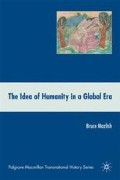Abstract
On May 24, 1915, Humanity, so to speak, was born. The Allied powers of Britain, France, and Russia charged the Sublime Porte, Turkey, with “crimes against humanity and civilization.” The crime being alleged was the genocidal slaughter of about one million Armenians. The actual “trial” did not conclude until 1921, when the Constantinople judicial process limped to an ending of sorts. The crime itself faded from memory as did the phrase crimes against humanity and civilization. 1 Humanity as a concept was, in fact, a still birth.
Access this chapter
Tax calculation will be finalised at checkout
Purchases are for personal use only
Preview
Unable to display preview. Download preview PDF.
Notes
D. M. Thomas, in his novel Ararat (London: Abacus, 1983), a book suffused with the presence of the Turkish-Armenian question, has one of his characters say, “‘Who now remembers the Armenians!’ Hitler once remarked to me” (124). It appears that everyone now remembers the Armenians. The problem is vibrant in Turkey, in the Armenian community in the United States, even in the halls of Congress, and among scholars of genocide everywhere.
Testimony to its presence is to be found in such an unlikely site as a popular “thriller” by Stuart M. Kaminsky, The Dead Don’t Lie (New York: A Tom Doherty Associates Book, 2007), at the center of whose plot is the Turkish-Armenian massacre/genocide of 1915.
Hannah Arendt deals with totalitarianism in many of her works, but the classic is The Origins of Totalitarianism (New York: Meridian Books, 1958; orig. pub. 1951).
For genocide per se, already cited are the excellent accounts by Erik D. Weitz, A Century of Genocide (Princeton, NJ: Princeton University Press, 2003)
and Gary Jonathan Bass, Stay the Hand of Vengeance: The Politics of War Crimes Tribunals (Princeton, NJ: Princeton University Press, 2000).
The term carries with it the danger of being overused and of making conflict, with its particularities, harder to understand. See, for example, Gerard Prunier, Darfur: The Ambiguous Genocide, rev. ed. (Ithaca, NY: Cornell University Press, 2007).
See Dinah Shelton, ed., International Crimes, Peace, and Human Rights: The Role of the International Criminal Court (Ardsley, NY: Transnational Publishers, 2000), 39.
Pippa Norris, “Global Governance & Cosmopolitan Citizens,” in Governance in a Globalizing World, ed. Joseph S. Nye, Jr., and John Donahue (Washington, DC: Brookings Institute Press, 2000), 5 and 18.
See, for example, Harald Fischer-Tine, “Global Civil Society and the Forces of Empire: The Salvation Army, British Imperialism and the Pre-History of NGOs (ca. 1880–1920),” in Competing Visions of World Order. Global Moments and Movements, 1880s–1930s, ed. Sebastian Conrad and Dominic Sachsenmaier (New York: Palgrave Macmillan, 2007). I will resume discussion of humanitarianism in Chapter 5.
Tony Judt, Postwar: A History of Europe since 1945 (New York: Penguin Books, 2005), 502 and 569.
Copyright information
© 2009 Bruce Mazlish
About this chapter
Cite this chapter
Mazlish, B. (2009). Humanity in the Global Epoch. In: The Idea of Humanity in a Global Era. Palgrave Macmillan Transnational History Series. Palgrave Macmillan, New York. https://doi.org/10.1057/9780230617766_3
Download citation
DOI: https://doi.org/10.1057/9780230617766_3
Publisher Name: Palgrave Macmillan, New York
Print ISBN: 978-0-230-61162-7
Online ISBN: 978-0-230-61776-6
eBook Packages: Palgrave History CollectionHistory (R0)

